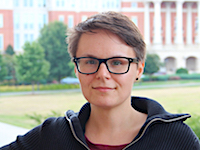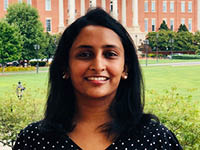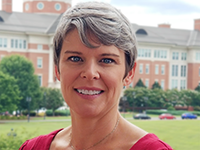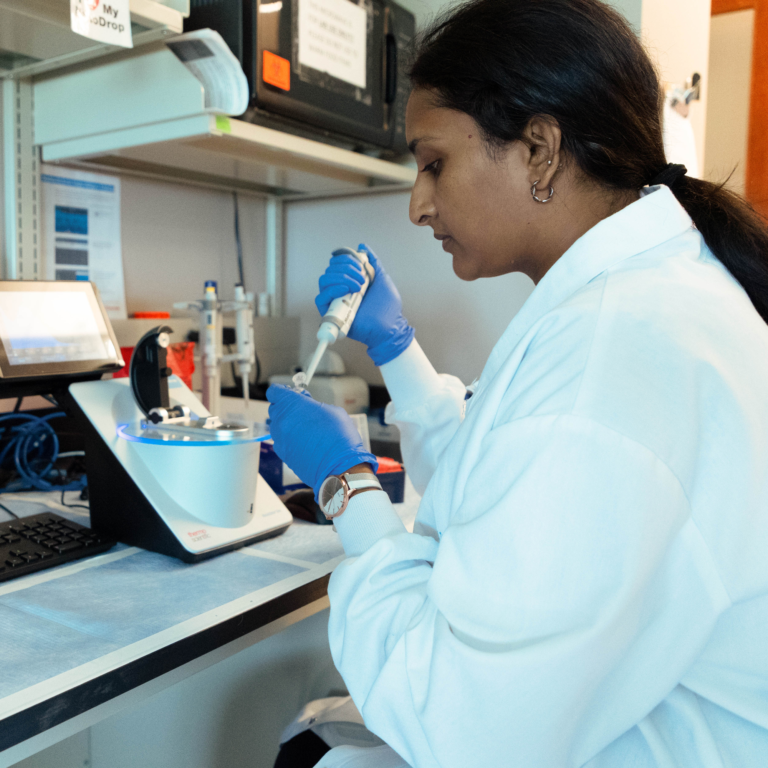Last week you met three of our current doctoral students and today we introduce you to three more.
The UNC Nutrition Research Institute (NRI) is helping mold the scientific minds of tomorrow by offering unique learning and work experiences for graduate students in the fields of nutrigenomics and metabolomics. The NRI provides training opportunities to the next generation of researchers in personalized nutrition. These young researchers, selected from the tops of their classes, are mentored by the NRI’s principal investigators while completing their degrees. Currently our institute is home to 12 graduate students furthering their education with our elite faculty.
 Kendra Nelson completed their MPH/RD at UNC-Chapel Hill in 2019 prior to coming to Kannapolis and joining the NRI. They’ve been working on their doctorate while here and will finish it this academic year. Nelson’s hometown is Cedar City, Utah. They are mentored by Saroja Voruganti, PhD.
Kendra Nelson completed their MPH/RD at UNC-Chapel Hill in 2019 prior to coming to Kannapolis and joining the NRI. They’ve been working on their doctorate while here and will finish it this academic year. Nelson’s hometown is Cedar City, Utah. They are mentored by Saroja Voruganti, PhD.
What kind of research do you do here?
I use data that other scientists collect to examine how someone’s genetic makeup, their body composition, and their metabolites might impact their risk or rate for cognitive decline in late life.
Why did you go into your field of study?
I grew up as a very heavy kid and ended up a very heavy adult. I learned a lot about nutrition to better my health and lose my excess weight, which changed my life drastically for the better. With first-hand experience of how much nutrition and lifestyle changes can impact one’s health and quality of life, I wanted to learn more and help others improve their nutrition status as well. I chose to pursue a public health degree because I believe population-level changes can have the greatest impact. I chose to become a dietitian because it’s helpful in understanding and teaching people how to translate nutrition research from the lab into how they can change the way they eat. And, I chose to pursue a PhD because I wish to be well-equipped to teach others the amazing things I have learned.
What do you hope to learn and accomplish during your time with the NRI?
I want to finish my dissertation successfully! At the NRI I want to learn all the skills necessary to be an independent researcher, equipped to answer the questions posed by myself or others about public health topics. I think the most important thing we can do as graduate students isn’t to answer a specific research question or have a specific finding; it’s to develop skills and knowledge that equip us to answer so many more research questions and find so many more answers.
Where do you think you’ll focus your attention in your career?
I want to use my public health background together with my quantitative research skills to examine emerging issues like the ethical, legal, and social implications of genetic research and of developing genetic testing and therapy technologies.
Is there anything you’d say to motivate someone who wants to pursue research in their education/career?
Don’t sell yourself short if you have an interest in something you think you’re not good at. It doesn’t matter how smart you are; I thought I’d never get anywhere because I thought I’m bad at science and math. But time and again I’ve leaned into these perceived weaknesses with unexpected positive results. The most important things to possess as a student (and I believe as a scientist) are intellectual curiosity, determination, and resilience. With these, you can find your way down any path you choose.
 Faustina Jeyaraj is in the fourth year of her doctoral program. She is from a small city in South India called Salem. Jeyaraj is mentored by Saroja Voruganti, PhD.
Faustina Jeyaraj is in the fourth year of her doctoral program. She is from a small city in South India called Salem. Jeyaraj is mentored by Saroja Voruganti, PhD.
What kind of research do you do here?
Our lab primarily focuses on nutrigenetics and nutrigenomics (diet-gene interactions). Nucleotides are building blocks of the DNA-blueprint of any organism. I am studying a metabolite involved in nucleotide metabolism—specifically purine metabolism called inosine and its effects on inflammation. I also study the genetic variability in nucleotide metabolism and transport and how it affects the health status of the individual.
Why did you go into your field of study?
I got into nutrigenetics and nutrigenomics research because I want to better understand the role of elements involved in gene regulation and their manifestation in diseases. This has the potential to help create therapeutic breakthroughs to enhance people’s quality of life.
What do you hope to learn and accomplish during your time with the NRI?
I work with volunteers who participate in ongoing studies; I also perform a variety of lab work. This work allows me to understand the research process in the lab and how the data collected through lab work can be used for applications in the real world.
Where do you think you’ll focus your attention in your career?
I thoroughly enjoy my work at the NRI; therefore, I hope to continue a career in nutrigenetics and nutrigenomics research and pursue a career in academia.
Is there anything you’d say to motivate someone who wants to pursue research in their education/career?
Research can be a challenging but rewarding career path. Research helps us stay curious and make the world around us better. If you are someone who thinks you want to make a difference in people’s lives, then a research career is a great way to fulfill that purpose.
 Angela Clontz is a second-year PhD student originally from Durham, NC. Clontz is mentored by Steve Hursting, PhD and Saroja Voruganti, PhD.
Angela Clontz is a second-year PhD student originally from Durham, NC. Clontz is mentored by Steve Hursting, PhD and Saroja Voruganti, PhD.
What kind of research do you do here?
At the NRI, I perform pre-clinical and clinical research to better understand the links between obesity and endometrial cancer.
Why did you go into your field of study?
Unfortunately, my family’s health history is filled with many cancers and other chronic diseases. This led me into the field of nutrition where I discovered how not only genetics play a role in cancer development but how cancer cells can use chronic inflammation from obesity to grow and metastasize.
What do you hope to learn and accomplish during your time with the NRI?
While at the NRI, I am expanding my understanding of cellular and cancer metabolism to pinpoint nutritional mechanisms where weight loss has a major impact in slowing and preventing cancer development.
Where do you think you’ll focus your attention in your career?
Currently, I am not certain where my focus will be beyond my studies and research; however, I have a strong interest in continuing my cancer research as a post-doc at the Institute for Molecular Oncology in Milan, Italy post-graduation from UNC-Chapel Hill.
Is there anything you’d say to motivate someone who wants to pursue research in their education/career?
Follow your passion and see where it leads you. My passion in nutrition and cancer prevention as led me on this current journey of discovery in a new field of interest that I hadn’t realized before.

